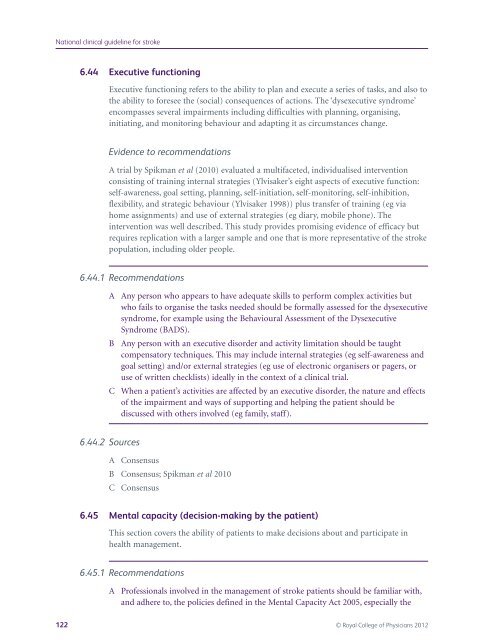national-clinical-guidelines-for-stroke-fourth-edition
national-clinical-guidelines-for-stroke-fourth-edition
national-clinical-guidelines-for-stroke-fourth-edition
You also want an ePaper? Increase the reach of your titles
YUMPU automatically turns print PDFs into web optimized ePapers that Google loves.
National <strong>clinical</strong> guideline <strong>for</strong> <strong>stroke</strong><br />
6.44 Executive functioning<br />
Executive functioning refers to the ability to plan and execute a series of tasks, and also to<br />
the ability to <strong>for</strong>esee the (social) consequences of actions. The ‘dysexecutive syndrome’<br />
encompasses several impairments including difficulties with planning, organising,<br />
initiating, and monitoring behaviour and adapting it as circumstances change.<br />
Evidence to recommendations<br />
A trial by Spikman et al (2010) evaluated a multifaceted, individualised intervention<br />
consisting of training internal strategies (Ylvisaker’s eight aspects of executive function:<br />
self-awareness, goal setting, planning, self-initiation, self-monitoring, self-inhibition,<br />
flexibility, and strategic behaviour (Ylvisaker 1998)) plus transfer of training (eg via<br />
home assignments) and use of external strategies (eg diary, mobile phone). The<br />
intervention was well described. This study provides promising evidence of efficacy but<br />
requires replication with a larger sample and one that is more representative of the <strong>stroke</strong><br />
population, including older people.<br />
6.44.1 Recommendations<br />
A Any person who appears to have adequate skills to per<strong>for</strong>m complex activities but<br />
who fails to organise the tasks needed should be <strong>for</strong>mally assessed <strong>for</strong> the dysexecutive<br />
syndrome, <strong>for</strong> example using the Behavioural Assessment of the Dysexecutive<br />
Syndrome (BADS).<br />
B Any person with an executive disorder and activity limitation should be taught<br />
compensatory techniques. This may include internal strategies (eg self-awareness and<br />
goal setting) and/or external strategies (eg use of electronic organisers or pagers, or<br />
use of written checklists) ideally in the context of a <strong>clinical</strong> trial.<br />
C When a patient’s activities are affected by an executive disorder, the nature and effects<br />
of the impairment and ways of supporting and helping the patient should be<br />
discussed with others involved (eg family, staff).<br />
6.44.2 Sources<br />
A Consensus<br />
B Consensus; Spikman et al 2010<br />
C Consensus<br />
6.45 Mental capacity (decision-making by the patient)<br />
This section covers the ability of patients to make decisions about and participate in<br />
health management.<br />
6.45.1 Recommendations<br />
A Professionals involved in the management of <strong>stroke</strong> patients should be familiar with,<br />
and adhere to, the policies defined in the Mental Capacity Act 2005, especially the<br />
122 © Royal College of Physicians 2012


